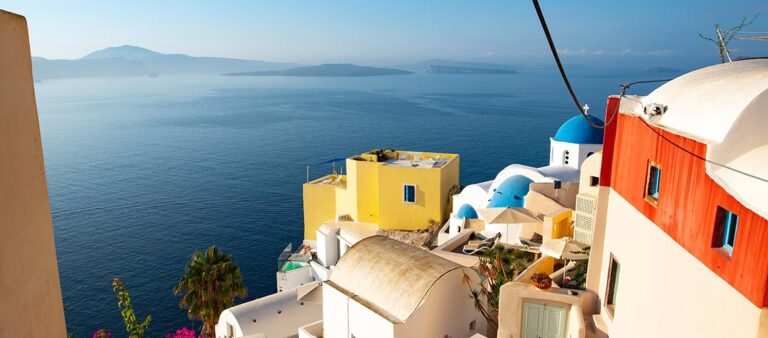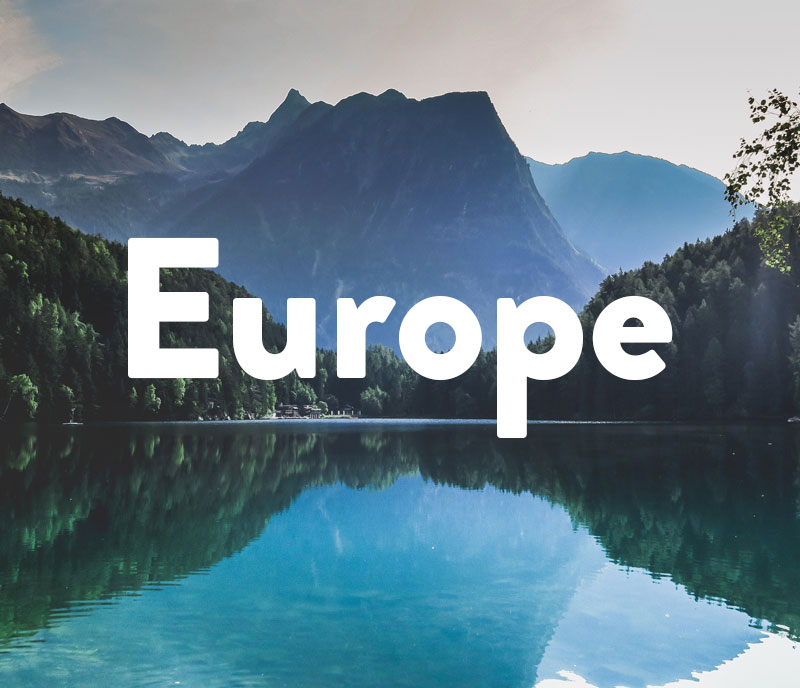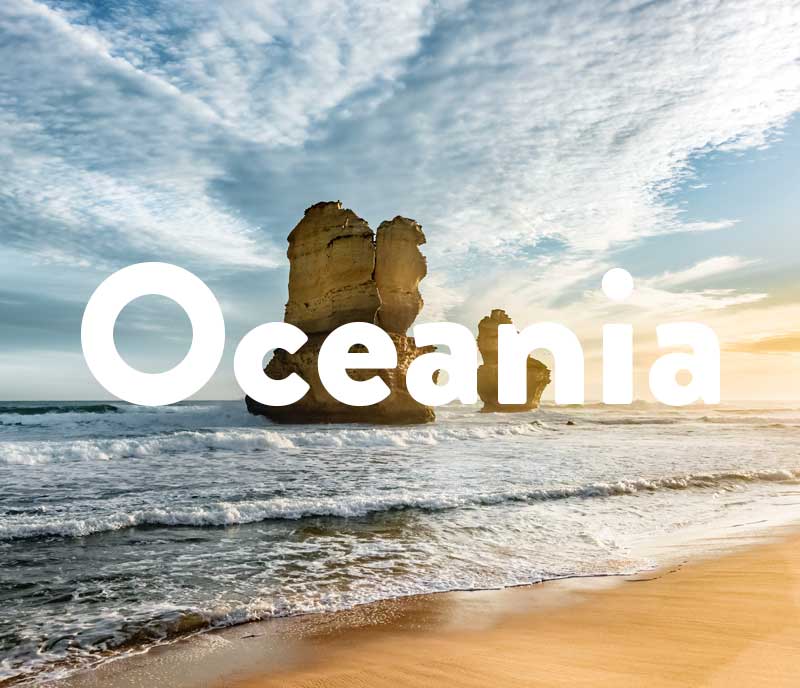Greece is one of the most beautiful places on the planet, and it is a country whose stories have played a significant role in the shaping of civilization as we know it.
Dive into our (free) travel guides below!
.
.
.
.
.
.
.
.
The key info
Located in the south and southeast of Europe, Greece is the southernmost country on the Balkan Peninsula. To the East, you will find the Aegean Sea, the West, the Ionian Sea, and to the south, we have the Mediterranean. Countries that share a land border with Greece include Macedonia, Albania, Bulgaria, and Turkey. The country consists of nine regions, across the mainland and the thousands of islands which are scattered across the Aegean and the Ionian Sea; 227 of which are inhabited.
With more than 28 million tourists visiting per year, Greece is a holiday hotspot. Providing fun in the sun alongside sight-seeing, history, and culture, this is a country that has a lot to offer any traveler.
Country in numbers
- Population number: 10,768,477
- Total size of the country: 131,957 km²
- Capital city: Athens
- Currency: Euro (€/ EUR)
- Language: Greek
- Religion: Orthodox Christianity (90%), Other Christians (3%, Non-Religious (4%), Islam (2%), Other (1%)
The 5 largest cities in Greece
1. Athens
Home to more than four million people, 40% of the Greek population live in the capital city Athens. Named after Athena, the Greek goddess of wisdom and strategy, Athens is one of the oldest cities in the world. Centuries of history have shaped the city known as the cradle of civilization and there are iconic landmarks around every corner. Marvel at the Acropolis, visits the Parthenon and make time to wander around the multiple museums and galleries. Whether you would prefer shopping in the Central Market or clambering to the summit of Mount Lycabettus for phenomenal views of the city, a trip to Athens promises to be a fascinating one.
2. Thessaloniki
Located at the heart of the Thermic Gulf in Northern Greece, Thessaloniki has one of the largest ports in the world and as a result, it is one of Greece’s most influential cities when it comes to commerce and industry. A city that is rich in history and culture, Thessaloniki is the capital of the Macedonia region. If you are visiting the city, don’t miss the chance to visit the White Tower to learn more about its exciting history.
3. Patras
At the foothills of the Pannahaikos Mountains, just north of the Peloponnese range, Patras is Greece’s third-largest city. Named after King Patreas, this is a port city that is popular with students and has ample nightlife. The annual Patras carnival is the largest event of its kind in Greece and it always delivers fun for the whole family. Also, if you are planning to take a road trip around Greece, this town is well situated for a convenient stop.
4. Heraklion
The capital of Crete, Heraklion is a cosmopolitan city that this is fascinating and vibrant. Although it may not be quite as pretty as the surrounding Crete, there are lots to see and do. The Palace of Knossos is particularly notable, and the Saturday market is a hit amongst locals and tourists alike.
5. Ioannina
Also known as Yanenena in Greek, this is a beautiful city in the North of Greece. It is a place that is steeped in mythology and legend, and a much-loved city amongst the locals. Spread around the stunning Lake Pamvotida, the scenery here is particularly breath-taking. The Castle at Ioannina is the oldest Byzantine fortress in Greece, dating back to 528 AD, and the nearby Dodoni Sanctuary and Theatre should not be missed.
Top tourist attractions
1. Acropolis, Athens
This ancient citadel is placed high about the city of Athens and it is the symbol of Greece. A 5th Century UNESCO-protected sanctuary it dominates the city skyline. A masterpiece of architecture, the Acropolis is one of Greek’s most visited landmarks and one of the country’s most important monuments.
2. Santorini
With white cliffside villages, beautiful beaches, and mesmerizing blue seas, Santorini is one of Greece’s most popular holiday destinations. This romantic escape is a holiday hotspot for a reason and it is particularly well suited for weddings, honeymoons, and proposals. The sunsets on this Volcanic Island are spectacular!
3. Mykonos
Mykonos is a cosmopolitan paradise where the rich and beautiful go to relax, unwind and party. Part of the Cyclades Islands, Mykonos offers the perfect location for anyone looking to party the nights away. This luxury getaway is one of the most famous islands in Greece, with white sands, blue seas, and nightlife to rival Ibiza.
4. Delphi
Once the home to the most famous oracle in Greece’s history; the Sanctuary of Delphi is one of the most popular ancient sites in Greece. Set amongst spectacular landscapes, the Sanctuary is located on the slopes Mount Parnassos. This ancient landmark is a symbol of unity in Ancient Greece and it was portrayed as the center of the world in Greek mythology.
5. Corfu
Situated in the heart of the Ionian Sea, Corfu is a beautiful island that is in the northwest of Greece. Offering multicultural charm, picturesque beaches and history, and tradition, it is one of the greenest islands in the country, and a favorite amongst tourists.
Best time to travel
Greece is one of the sunniest places in the world, with an average of 250 days of sunshine each year, and there is not really a bad time to visit. If you are a sun worshipper who plans to relax on the beach and soak up the rays, July and August are the hottest months. However, if you would rather avoid high temperatures, a trip to Greece in spring or fall would be ideal. Although it may be wise to avoid Easter week, as this is an important holiday and it can get quite busy. If you are heading to Greece for some sightseeing, visiting in the winter is an excellent way of picking up a great deal and beating the queues.
Holidays in Greece
- 1 January: New Year’s Day.
- 6 January: Epiphany
- 11 March: Green Monday
- 25 March: National Greek Holiday
- 19 April, Good Friday.
- 21 April: Easter Sunday
- 1 May: May Day.
- 15 August: Assumption of Mary.
- 28 October: Ochi Day
- 25 December: Christmas Day.
- 26 December: Synaxis of the Mother of God
In accordance with Greek Law, every single Sunday in Greece is considered a national holiday.
Visa requirements
The visa requirements when you are traveling to Greece will depend on your country of origin. As part of the Eurozone, European citizens are free to live, work and travel in Greece.
If you are from the UK, the current situation is unclear until after Brexit is decided and it is advised that you check current government advice. Non-European citizens may need to apply for a Schengen visa.
Currency
After using the drachma for almost a millennium, the currency in Greece is now the Euro and has been since 2002. Notes include denominations of 500, 200, 100, 50, 20, 10, and 5. Whilst major credit and debit cards are widely accepted, it is advised that you carry some cash as smaller cafes traditional tavernas may have a cash-only policy. Also, if you want to exchange money for your trip, it is advised that you do it at home to get the best possible rates.
Packing must-haves
What for you pack for your trip will depend on what you plan to be doing. In sunny screen, hat, sunglasses, and sunscreen are a must. Think light colors, floaty clothes, and natural fabrics. Plus, most people will want to take beachwear, with so many stunning coves and beautiful beaches to discover. However, some warmer layers are also recommended, as at certain times of the year, it can get a little chilly in the evening. Depending on your country of origin, you may also need a power adapter.
DOs and DON’Ts in Greece
| Do | Don’t |
| Wear appropriate clothing- Greece is a fairly religious country, and if you are visiting churches, you should cover up your shoulders and legs. | Turn down an invite- Greeks are renowned for their hospitality and Greece is truly is one of the most welcoming countries in the world. |
| Try the Food- Whether it is cheap gyros to cure the hangover, moussaka, or sticky sweet Baklava, Greek food is one of the best cuisines in the world. It is not only fresh and delicious; it is also one of the healthiest ways of eating. | Making the sound of spitting (ftou ftou ftou) is often done to protect from the Evil Eye. |
| Drive carefully- The way in which Greeks tend to drive, may not be quite what you are used to. Make sure you pay full attention on the roads. | Be offended if you get spat at – No actual saliva is shared but Greeks may believe that this will ward off any curse. |
| Drink bottled water- The water in mainland Greece is reported as being safe to drink, but on the islands, you will need to ensure that you are drinking bottled water | Wave- Thrusting your palm into someone’s face is considered highly rude and Greeks may interpret this seemingly innocent gesture to mean something quite different. |
Secret tips from bloggers
- Check out the spectacular Polylimnio Waterfalls in Messina – Greek Gods Paradise
- Visit Loutro, an unspoiled paradise in Crete – TheTravel.com
- Astir beach is where the in-crowd go to relax – Forbes
- Don’t try to cram too much into one trip! Pick a group of islands for the best possible experience – The Broke Backpacker
TOP 7 Instagrammable Places
- #sarakiniko (38k)
- #santorini (431k)
- #acropolis (1.1m)
- #littlevenice (265k)
- #parthenon (426k)
- #templeofzeus (35k)
Fun facts about Greece
Did you know…?
- Name days are celebrated more than birthdays
- Greece if officially named the Third Hellenic Republic, but Greeks tend to say Hellas or Hellado
- Greece is the leading producer of sea sponges
- The origins of plate smashing are disputed, with some believing that smashing plates at a wedding were thought to fool malicious spirits. Nowadays that belief is less common!







